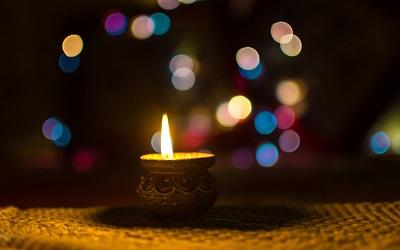Day 234, Year of #Mygration: Culture across continents

In today’s post, Jiten Patel, Head of Equality, Diversity and Inclusion at The Open University, revisits his memory of Diwali and explores how culture is transmitted from one generation to another even when families live far away from their traditional homeland. This post follows Jiten’s personal testimony on cross-cultural heritage, published earlier this year.
Early November 2018 saw the celebration of the Hindu Festival of Light, Diwali. A youngster, being 3rd generation asked his grandparent to explain what the meaning of Diwali was. Unfortunately, the grandfather, being 1st Generation was only able to speak in his mother tongue, and the child could only speak in English. There was a disconnect. The grandfather spoke broken English and was not able to communicate articulately to the child in English. Finally, after a few attempts, he called the elder grandchild (the grandfather knew that he had been going to classes at his local temple) and asked him to explain the story of Diwali to the sibling. The following is what the elder grandson told, the younger grandson:
"So look, this dude Ram had, like a big kingdom, & people liked him but like his stepmom or sumthin, was kinda weird and she forced her hubby to send this Ram to some jungle or something...
Coz he was goin for 14yrs, So his wife n bro got along ...(U know just 2 chill)
But dude, the forest was real scary sh*t ... Was full of devils n things like dat,but dis dude killed them with arrows ...
But den sum bad gangsta- Ravan
picked up his babe Sita... Dis Dude Ram n his bro got real mad ... huh ...
So dey got an army of monkeys ... don't ask how ... Attacked Ravan
got d babe n returned home ... People thought at least dey deserve something.
Dey had no bars or clubs or smoke stuff to party.
So they lit lamps ... N this is how it all started. “
The story made me smile. It also made me reflect on the fact that maybe the grandfather would have been shocked at the translation. Did it get the message across? Perhaps. Did it get across the underlying values and morals that the original epic intended? Probably in such a diluted way that its real significance was skewed. What, if anything, applied to the story of Rama and his exile of 14 years in today’s day and age?
The more I thought about this, the more I realised that the translation did convey the values of the story and the significance of Diwali. The underlying meaning was to ensure that, in whatever situation we find ourselves, can we behave with integrity and authenticity. In modern-day Britain, Diwali is still celebrated by Hindu families, but often an even greater celebration occurs at Christmastime. Why so?… As I reflect on my childhood in this country, I remember how, when we would got back to school after the Christmas holidays, all the other kids were so excited about the presents they had received. I had received non. I was unable to explain to my school friends that my parents did not celebrate Christmas and that, while Christmas day was a public holiday in India, it paled into insignificance against Diwali. Neither could I boast about Diwali because, for my parents, life was much more about getting the family (siblings, cousins, their kids, etc.) settled. They could not spare the luxury of buying expensive presents for my brother and I. Even when I was a young teenager, I remember so vividly how our Saturday evening treat was to share one can of Coca-Cola between my brother and I, and we got to eat English food; a sandwich!
How things have changed! My wife puts in so much effort into Christmas and spends vast amounts of money on Christmas presents, as do most of my relatives. I guess they, too, are acting on the echoes of their respective past lives. This year my family and I attended a Diwali Programme organised by my community organisation and in one part, a young girl recited the meaning of Diwali… as she came to the end of the formal part of the story, she announced, "now that's the boring bit over with….for me, it’s all about all the delicious food my granny makes…. Ghugraas (Sweet Crispy Dumplings), Chevda (Bombay Mix), Barfi (Milk-based fudge-like sweet)." The story continued for a few more minutes, and everybody was laughing.
Of course, it had been designed to be funny and, as you might imagine, the story recounted earlier was probably an attempt by the elder sibling to be funny.
Times, circumstances and even countries of residence may change, but what endures is the values with which we are brought up. If we look at folk tales (whether we believe them to be real or fictional), they are based on the fundamental principles of integrity, authenticity, selflessness and the suchlike. They exist in all cultures and variations of the same story can be found across faith, race and ethnicity boundaries. My kids love Harry Potter and, again, it is all about the eternal struggle of good versus evil; it is about doing the right thing. Interestingly, Harry Potter, in Hindi is often transliterated to Hari Putther. That translates as Son of God. Rama, the central character in the festival of lights (Diwali) was known as an Incarnation of Vishnu, so in some respects, also ‘Son of God', who was venerated for being good and for prevailing over evil. He gave the light of hope and the prospect of a better future. Are our cultural values so different after all?
Contact our news team
For all out of hours enquiries, please telephone +44 (0)7901 515891
Contact detailsNews & articles

The FUNdamentals: Why fun matters more than we think
In a world that feels increasingly serious and pressured, fun can seem like a guilty pleasure — something optional, even frivolous. But what if fun isn’t an add on at all? What if it’s essential?